How Tariffs, AI, and Robots Will Reshape Industry and Humanity
Tariffs are breaking old trade ties. AI and robots are rewriting the rules. The U.S.–China split is just the beginning of a new world map drawn in algorithms, not alliances.
Is the global society becoming an "Information Civilization?" What does it mean? Ramifications? Opportunities? Downside? New thought processes are being formed.


प्रतिबिंब (Reflection) by Drishtikone
“It may be normal, darling; but I'd rather be natural.” ― Truman Capote, Breakfast at Tiffany's, and Three Stories
Thank you Virenji for a generous contribution to Drishtikone! Thank you again, sir. 🙏
Unity is a deceptive word.
It is never formed on a diverse set of experiences. But the rules of a “United front” are always established by the one who “leads.” Or, in other words, kills the most.
The aggressive and the exclusivists decide the rules of unity. Not the inclusivists.
Inclusive existence necessarily renders itself as the easiest target of the most brutal exclusivists.
So, when the “One World Order” propagandists start their spin on the moral principles they serve for humanity, it is time to see through the crap.
Colonialism is the goal. Even when the professed objective is profit and optimized resources.
Surveillance is the new weapon. Information the new weapon. And, we are the explosives that give the weapons their power. Against us.
For this audience - there is a new realm of scholarship, research, and analysis that is developing. It provides the indigenous voices an opportunity to de-legitimize colonialism.
Will we use it?
In a TV series “The 100,” one of the main characters - Octavia - is part of 100 kids who were sent to the Earth to check its ability to sustain life. An Earth, which had been destroyed by a devastating nuclear war caused by a malfunctioning Artificial Intelligence machine and the subsequent radiation meant that only a few humans who were in space remained alive.
That shy girl becomes a fearsome warrior. In another series of events, Earth sees another fatal attack where different tribes come together in an underground dungeon. She wants to unite all of them. So she announces - that everyone is a “Wonkru” (or one tribe, in the then tribal language). And, in an interesting situation, she comes up with the slogan -
Either you are Wonkru or the Enemy of Wonkru
And, that starts a series of events where everyone is each other’s spy, enemy, and nemesis. Some in the inner coterie have the power - ultimate power - which endless killings and battles happen.
In the name of “One World Order” - the Wonkru.
The urge for those who have the power - of weaponry, strength, or money - to create the “One World Order” where the ways of “My people” overrule everyone else’s is a peculiar Western fetish.
Octavia did not care whether her idea of humanity and its progress or even the way of being was the most useful or not. She wanted to “unite” the tribes on her own terms and it was her way that had to be the only supreme way.
The Western way of life has brought a set of developments in human experience that are unique but not without their consequences. Humanity has not paused to think through the ramification of what will happen if this way of life becomes the “only way of life.”
World Bank’s Changing Wealth of Nations report released on October 27, 2021 lays it out very clearly. The report is unique as it looks at not just the ‘prosperity of nations and wealth created but also the sustainability of the economies.
The Changing Wealth of Nations 2021 tracks the wealth of 146 countries between 1995 and 2018, by measuring the economic value of renewable natural capital (such as forests, cropland, and ocean resources), nonrenewable natural capital (such as minerals and fossil fuels), human capital (earnings over a person’s lifetime), produced capital (such as buildings and infrastructure), and net foreign assets. The report accounts for blue natural capital—in the form of mangroves and ocean fisheries—for the first time. (Source)
The picture that this report (Source for download) paints is grim and devastating.
According to the report, global wealth grew significantly between 1995 and 2018, and middle-income countries are catching up to high-income countries. However, growing prosperity has been accompanied by unsustainable management of some natural assets. Low- and middle-income countries saw their forest wealth per capita decline 8% from 1995 to 2018, reflecting significant deforestation. Meanwhile, the value of global marine fish stocks collapsed by 83% due to poor management and overfishing over the same period. The projected impacts of climate change may exacerbate these trends.
The report, based on their analysis, gives four policy recommendations for a ‘sustainable future’.
The obvious question that we need to ask and that the future generations will face is:
Are we simply straightening the deck of the Titanic?
If wealth - and the consequent ramifications of “poverty” in the modern sense - stares in your face, will you really follow a sustainable path to “prosperity”?
It is not an ethical question. It is an existential probe.
Life on the planet has nothing to do with ethics and morals. It has to do with existence.
So the question is much larger - given a larger time span of human existence, is the Western way of living the best way of living that humans can aspire for on this planet?
And, a related question to the likes of Elon Musk who thinks that a colony on Mars for the rich and famous can be a good idea is - if humans could not sustain a planet built for human life to emerge, then can they sustain an artificially created abode?
Again, this has nothing to do with ethics or morality. It needs to be a seeking to our existential reality.
Can policies that merely tinker with our ways save a planet from our greed that is predicated on the destruction of nature as the proxy for development?
Or
Do we need to reassess our fundamental approach to life itself?
And, then you suddenly are faced with the reality that embedded in what Octavia (and many autocrats, including the modern scientists, and dictators) may have tagged as “primitive” or backward, may actually be the only real sustainable way to live.
It takes a whole different approach to
Vs
What is “modern” may not be more than transient. And what is backward and primitive may be the way for posterity.
If the former manifests in Octavia, then no matter how strong the unity of Wonkru, the planet, as Octavia and the rest found out will be destroyed nevertheless!
Overlaying the reality of resources, nature, and life on this planet is the information on every action, life, movement, thought, and decision.
That is the driver, if you will, of the collective human action.
Through the march of the Western way of life, the economies have gone from Agricultural Age to Industrial Age and now to the Information Age.
In every age, the main component is in mass production, and that abundance is then harnessed to create wealth and colonize and rule others.
We have often called this time that we live in as the “Information Age.” A society that lives on information that is brought forth by small yet smart gadgets like phones, watches, etc is an “Information society.”
But the question we need to explore is:
Is this the “Information Civilization?”
A civilizational definition that cuts across societies, cultures, regional ways, and languages. If it is so, then what kind of civilizational entity are we as a human race building?
Shoshana Zuboff, the Charles Edward Wilson Professor Emerita at Harvard Business School has written a very thought-provoking book “The Age of Surveillance Capitalism: The Fight for a Human Future at the New Frontier of Power”
It looks at what Shoshana describes as Surveillance Capitalism.
What is it?
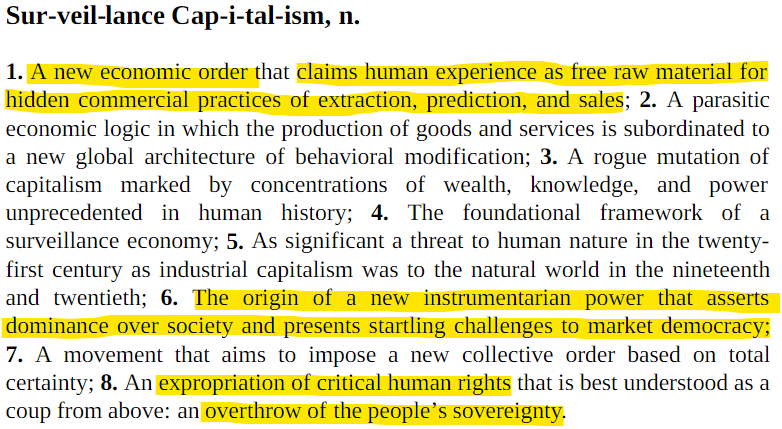
With human experience as a free input, the corporations - mighty ones - are now creating behavioral futures markets.
Even when human beings realize and know the consequences of their continued participation and sharing of their data, they cannot stay away because they are expected to keep up due to overpowering social trends. The information shared despite the critical view of the platforms enables the advertising, messaging and propaganda groups and companies to envelope even those who do not want to be part of the system, to be impacted by the larger social messaging and advertising blitzkrieg. Without anyone realizing, they are offering themselves up for control and subversion.
It is Slavery 2.0 - voluntary and self-inflicted slavery.
Jaron Lanier, the Silicon Valley ‘computer philosopher', discusses the process of addiction that is used by the social media companies and how it is ruining individuals and societies.
Shoshana came up with a new term which was a derivative of totalitarianism - Instrumentarian.
It's a centralized totalitarian power that is specifically understood as functioning through the mechanisms of terror and murder. That's what totalitarianism is. Instrumentarian power wants to control you, but it doesn't care about hurting you. It wants to control you toward its guaranteed commercial outcomes. It’s making you, you as Noah, are simply instrumentalized toward the outcomes of its business customers, right? So you’re a means to others’ commercial ends. (Source)
Shoshana believes that there is no power struggle here for the sake of power. They are not there to hurt or kill you.
One does not necessarily agree with that. There is a very clear Left-liberal bias in all the tech firms and their algorithms with one clear objective - Profit and Control. That does not happen in a moral vacuum. It entails control, hurt, and even genocide or famines if that is what it takes.
It goes against the indigenous voices of the people - like Hindus in India or Buddhists in Myanmar - and has a very clear favor for Islamism and totalitarianism manifesting from that.
For example, when Hindus in Bangladesh were being targeted by Muslims there based on a fabricated set of events, the account of the group which was bringing the plight of indigenous Hindus to light was blocked and suspended by Twitter.
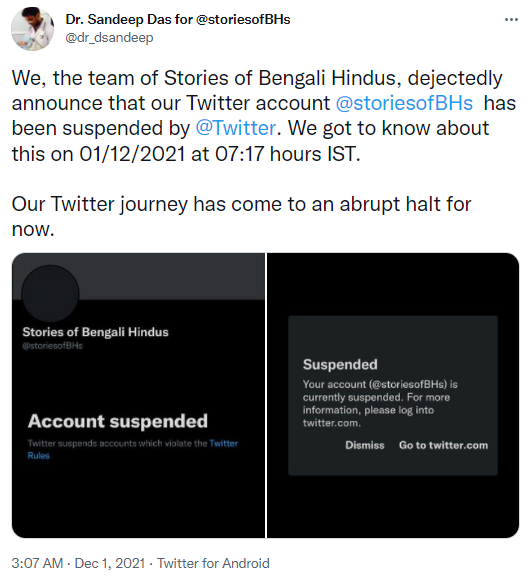
Meanwhile, Twitter has a clear preference for Islamic Jihadis like Taliban. Taliban usurped power in Afghanistan on the back of unprecedented horrific massacres and their continued control over that country has unleashed terrible crimes against people and women.
With large-scale massacres and continued and unabated Human Rights abuses, the Taliban is a humanitarian nightmare. But not for Twitter.

But Twitter allows Taliban representatives to share their narrative and create the halo of legitimacy. Specifically, when they have the following running into half a million followers each!
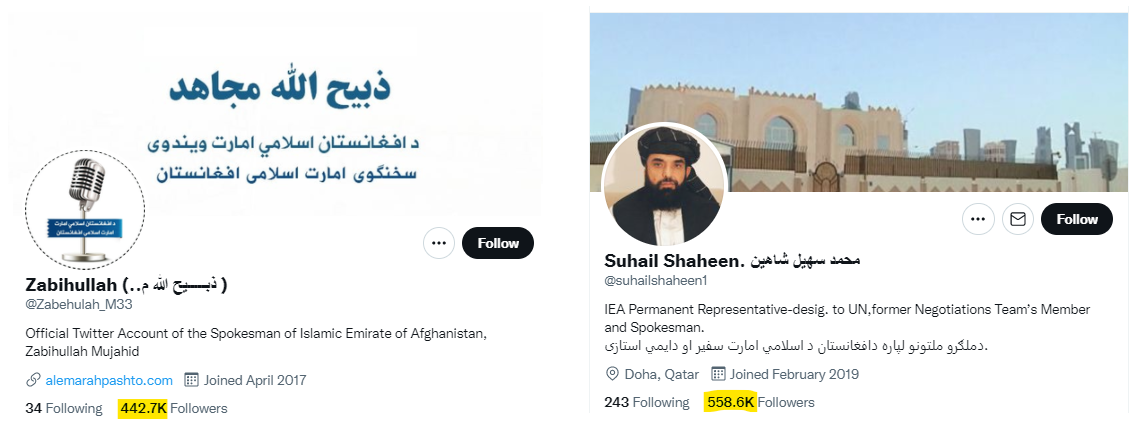
It is evident to any objective observer that there is a strong element of neo-colonialism intertwined within the larger game of technological superiority and informational monopoly that few have over our collective data.
Yes, it is for-profit and economic gain. But that profit motive is not a stand-alone economics-inspired endeavor. It is a tool for a new colonial system, where imperialistic structures are being created in a new format. And probably even more overwhelmingly brutal. Michael Kwet (Visiting Fellow of the Information Society Project at Yale Law School), for example, writes in Al Jazeera about the neo-colonialism of the digital age.

You see to understand this talk of neo-colonialism, we need to go to often forgotten moves by the Indian government.
But first read this tweet by Marc Andreessen, a Silicon Valley legend and co-founder of Netscape (the first widely used browser) and member of Facebook’s board of directors,
“Anti-colonialism has been economically catastrophic for the Indian people for decades,” Andreessen wrote. “Why stop now?” (Source)
Remember this mindset.
That fight against colonial power by the Indian people, who were subjected to colonial slavery by the British for over 250 years where the land, the economy, and culture were plundered and degraded - was an economic catastrophe!
Necessary enslavement of people whom someone like Andreessen has deemed as backward - is the fundamental input into the models of future business age.
Now, for the story.
Facebook and other tech firms wanted to create a monopolistic model of internet access and economy where few sites would get the advantage of access via a tariff mechanism.
Critics of this mechanism fought for “Net Neutrality”.
Facebook offered what it called “Free Basics”. It was a surreptitious way of creating gatekeepers to the internet. The Indian government shot it down in 2016 (Source). In a tough battle between Facebook and Net Neutrality advocates, the Telecom Regulatory Authority of India (TRAI) went with the latter.
The move effectively bans a Facebook program called Free Basics, a suite of lightweight versions of popular sites—including, of course, Facebook—that don’t eat up data the way visiting other mobile sites does. The idea is to give people an affordable way to get online, but it has long been criticized by advocates for net neutrality as a way of giving an unfair advantage to certain websites. If you offer only a certain group of websites for free, the argument goes, doesn’t that give an unfair advantage to those sites? You don’t have to actively block or throttle your competitors to destroy them. (Free Basics is billed as open, meaning anyone can add their website to the platform, but Facebook still sets the guidelines that dictate use.) (Source)
The resistance to the colonial ways of Facebook was best brought out by this one comment in Reddit in an AMA hosted by facebook’s VP.
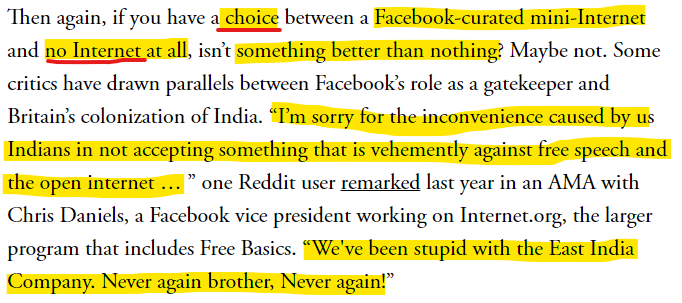
Please do note the interesting use of the word “choice” and the two options - Facebook-curated mini-internet and No Internet At All.
No internet at all?
Decides who?
Enforces who?!!
Tech firms? Against - the Indian citizenry? REALLY?
Isn’t an embargo by tech corporations against an entire society akin to colonial structures of slavery?
How the bloody heck is slavery even a choice?! Even the magazine writer - ostensibly sympathetic to Indian fightback against internet take-over - in a Freudian slip posits slavery as one of the two options, where freedom is not even on the table!
Nick Couldry and Ulises A. Mejias write in the “Internet Policy Review” journal that yes, the creation of economic value is the argument. But the real consequence is colonialism.
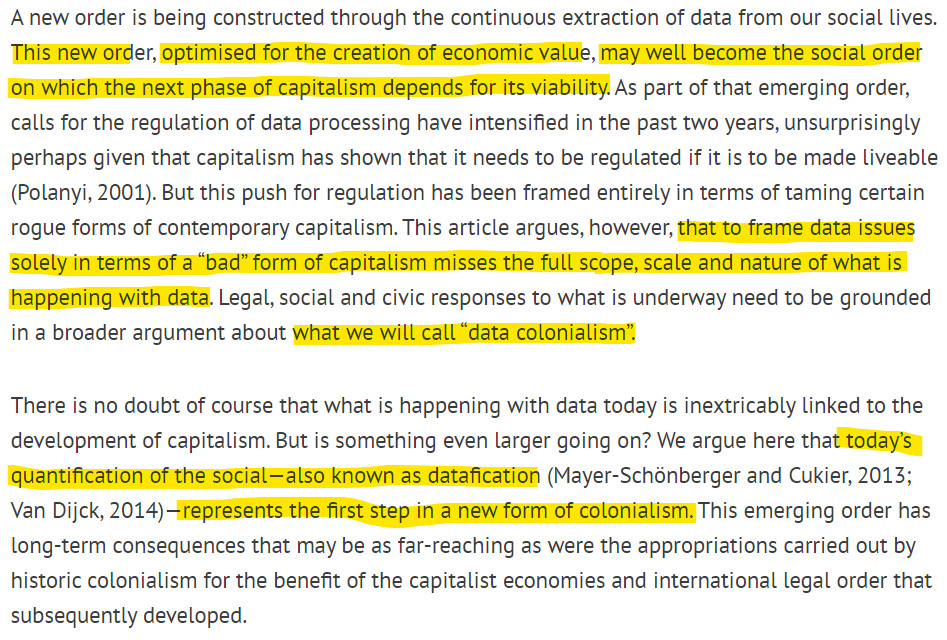
You see it is not Surveillance Capitalism but really Surveillance Colonialism. To mistake or water it down, the latter for the former is to provide a window for legitimacy to the power-hungry criminals of the human race.
The forever colonialists.

Leftists’ Misogynist Utopia: On December 2, Tiruvalla Police in Kerala arrested 39-year-old Chumathra Elimannil Saji, a member of the Communist Party of India (Marxist), for circulating a nude video of a female CPI(M) member online. He has been booked under relevant sections of the Information Technology Act. Apart from Saji, 11 others have been named in the case. While Saji got arrested, the other 11 are absconding. CPI(M) branch secretary CC Sajimon and Democratic Youth Federation of India (DYFI) leader Nasar have been named as the main accused in the case. As per Kerala Police, these two stripped the woman and took her nude photos. The video was widely shared on social media platforms, the reports suggested. Meanwhile, the victim woman has been suspended by CPI(M) for filing a complaint against the party leader. According to a report in Mathrubhumi, the woman worker was suspended pending investigation on the basis of a complaint filed by the Mahila Association. (Source)
NHAI Tree Planting: The total number of trees planted by the National Highways Authority of India (NHAI) along the National Highways from 2017-18 till October of 2021-22 is 2.23 crore. Also, 55.1 lakh plants have been planted in 94 projects, completed by March 2021. (Source)
Allergies help avoid COVID-19: People with allergic conditions such as hay fever, eczema, and rhinitis may be at a lower risk of catching COVID-19, according to a new study. A team of 34 British scientists found allergy sufferers who also have asthma were less likely to contract the potentially deadly virus. In a surprising twist, the researchers found being older, male, or having underlying conditions did not raise the risk of infection — a contrary finding to other studies. Allergy-related conditions such as hay fever and eczema, which are triggered by allergens, were associated with a 23-percent lower risk of coronavirus infection. (Source)
Bulletproof Hosting for Criminals: A Russian national charged with providing bulletproof hosting services for cybercriminals, who used the platform to spread malware and attack U.S. organizations and financial institutions between 2009 to 2015, has received a 60-month prison sentence. 34-year-old Aleksandr Grichishkin, along with Andrei Skvortsov, founded the bulletproof hosting service and rented its infrastructure to other criminal clientele for distributing a wide range of malware and attempted to cause millions of dollars in losses to U.S. victims. (Source)
Future of Eating and Work: Facial recognition is already common for phones, but “In 30 years it’s quite possible that you will not use a key or even a credit card. You’ll use your face or iris to make purchases and open locks. Recognition will be that good,” said Martin Ford, author of “Rule of the Robots: How Artificial Intelligence will Transform Everything.” “The scary thing, though, will be if someone hacks your biometric data. Right now you can call the bank to change your pin or cancel a credit card. But you can’t cancel your biometrics.” But the solution to that might be as simple as swapping out your eyes and implanting them with bionic peepers that provide updated and impenetrable information to open your house door or buy a bagel at the local deli. According to Future Timeline, by the late 2040s, lab-made retinas will not only be as good as biological eyes but will also come souped-up with add-ons such as built-in cameras, zooming capabilities, and special night-vision adapters. Meanwhile, the digital currency will be more than just money. Coins and other crypto-related items, according to will come implanted with inflexible contracts. (Source)
Snow to Rain in the Arctic: Rain could replace snowfall as the main form of precipitation in parts of the Arctic by 2060 thanks to climate change - up to two decades earlier than previously thought. In the study, researchers from the University of Manitoba compared the latest projections with the results of previous climate models. Precipitation levels are on the rise in the Arctic, as rising global temperatures melt increasing amounts of sea ice, adding moisture to the air. (Source)
President Xi Jinping and the Chinese establishment have increased the jingoistic rhetoric and aggressive actions against Taiwan recently. This is after they have subdued Hong Kong and destroyed democracy there comprehensively. Australia is now feeling the heat as well. This is an insightful set of discussions on how the Australians are looking at things from their perspective.
If you like our content and value the work that we are doing, please do consider contributing to our expenses. CHOOSE THE USD EQUIVALENT AMOUNT you are comfortable with.
If you like this post - please share it with someone who will appreciate the information shared in this edition.
Today’s ONLINE PAPER: Check out today’s “The Drishtikone Daily” edition. - THE DRISHTIKONE DAILY